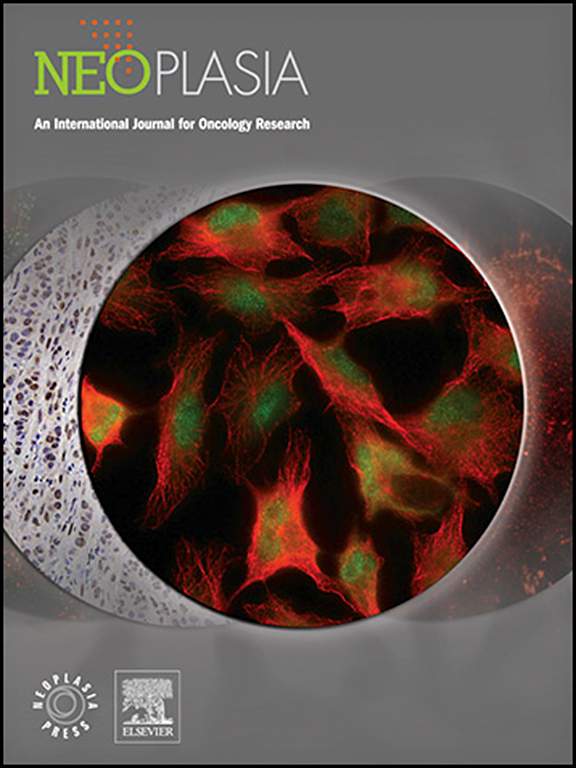肿瘤相关巨噬细胞通过CCL20-CCR6轴促进膀胱癌转移。
IF 4.8
2区 医学
Q1 Biochemistry, Genetics and Molecular Biology
引用次数: 0
摘要
我们研究了膀胱癌(BC)细胞和肿瘤相关巨噬细胞(tam)之间相互作用的机制。将BC细胞系(UMUC3和T24)与从THP-1分化为m2样tam的巨噬细胞样细胞共培养,发现分化簇(CD) 68表达降低,CD206表达增加。这种分化增强了BC细胞的迁移和侵袭。此外,m2样tam显著增加C-C基元趋化因子配体(CCL) 20的分泌,通过其旁分泌作用,通过MEK/ERK信号通路促进BC细胞迁移和侵袭。与tam共培养也提高了BC细胞中CC趋化因子受体(CCR) 6的表达,表明对CCL20的敏感性增加。人BC组织免疫组化分析显示CCR6表达水平与BC预后有显著相关性。体外和体内抑制CCR6可减少BC细胞转移。此外,发现BC细胞分泌CXCL1有助于巨噬细胞的m2样极化,并通过自分泌和间接作用增强BC细胞的迁移和侵袭。综上所述,CCL20和CXCL1在BC细胞与tam的相互作用中起着至关重要的作用。本文章由计算机程序翻译,如有差异,请以英文原文为准。
Tumor-associated macrophages promote bladder cancer metastasis through the CCL20-CCR6 axis
We investigated the mechanisms of interaction between bladder cancer (BC) cells and tumor-associated macrophages (TAMs). Coculturing BC cell lines (UMUC3 and T24) with macrophage-like cells differentiated from THP-1 into M2-like TAMs revealed a decrease in Cluster of Differentiation (CD) 68 expression and an increase in CD206 expression. This differentiation enhanced BC cell migration and invasion. Additionally, M2-like TAMs significantly increased the secretion of C–C motif chemokine ligand (CCL) 20, which promotes BC cell migration and invasion via the MEK/ERK signaling pathway through its paracrine effects. Coculturing with TAMs also elevated the expression of CC chemokine receptor (CCR) 6 in BC cells, indicating increased sensitivity to CCL20. Immunohistochemistry analysis of human BC tissues showed a significant correlation between CCR6 expression levels and BC prognosis. Inhibition of CCR6 reduced BC cell metastasis both in vitro and in vivo. Additionally, CXCL1 secretion from BC cells was found to contribute to the M2-like polarization of macrophages and to enhance BC cell migration and invasion through autocrine and indirect effects. In summary, CCL20 and CXCL1 play crucial roles in the interaction between BC cells and TAMs.
求助全文
通过发布文献求助,成功后即可免费获取论文全文。
去求助
来源期刊

Neoplasia
医学-肿瘤学
CiteScore
9.20
自引率
2.10%
发文量
82
审稿时长
26 days
期刊介绍:
Neoplasia publishes the results of novel investigations in all areas of oncology research. The title Neoplasia was chosen to convey the journal’s breadth, which encompasses the traditional disciplines of cancer research as well as emerging fields and interdisciplinary investigations. Neoplasia is interested in studies describing new molecular and genetic findings relating to the neoplastic phenotype and in laboratory and clinical studies demonstrating creative applications of advances in the basic sciences to risk assessment, prognostic indications, detection, diagnosis, and treatment. In addition to regular Research Reports, Neoplasia also publishes Reviews and Meeting Reports. Neoplasia is committed to ensuring a thorough, fair, and rapid review and publication schedule to further its mission of serving both the scientific and clinical communities by disseminating important data and ideas in cancer research.
 求助内容:
求助内容: 应助结果提醒方式:
应助结果提醒方式:


